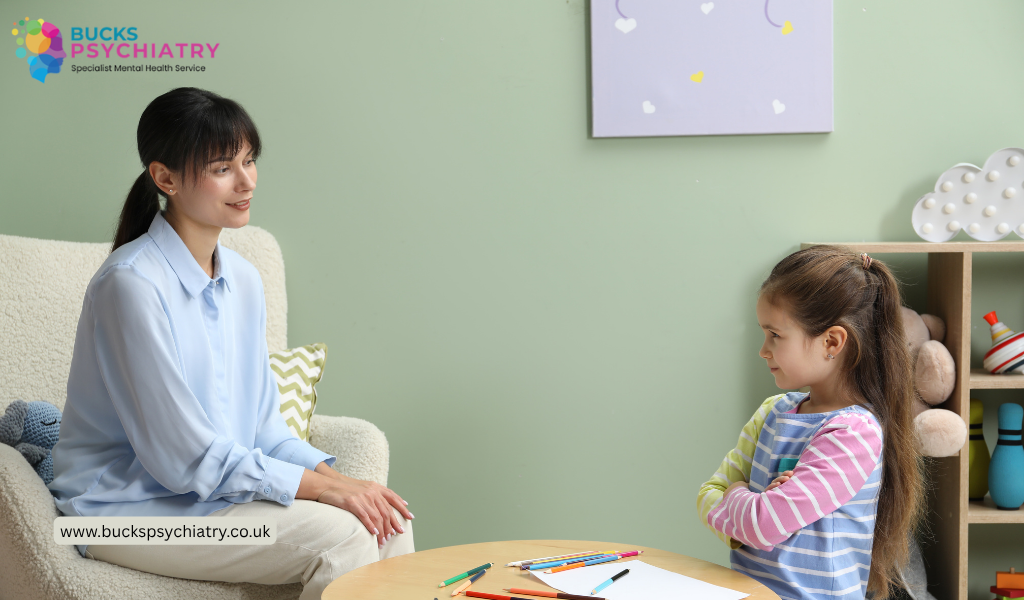0–4 Years: The First Years Are Very Important
The first four years are very important for a child’s mind. Even before birth, babies start learning about the world.
Parents’ love and care help babies feel safe. Hugs, smiles, and praise make babies confident. Babies who feel safe learn to calm themselves when they are upset.
Some babies face more problems. Babies whose parents are sad, worried, or use alcohol or drugs may have a harder time. Babies who are not cared for or live in poor homes may also struggle.
Programs like home visits for parents, parenting classes, and help for mothers can support babies. These programs help children grow strong and happy.

Learn More: Why Occupational Therapy Matters For Children With Autism?
5–10 Years: School and Friends Matter
When children start school, teachers and friends become important. School can make children feel happy or stressed.
About 8 out of 100 children in this age have a mental health problem. Boys are more likely to show behavior problems than girls.
Bullying is a big problem. Children who are bullied may feel sad, scared, or worried. Schools that care about mental health help children feel safe.
Friends, kind teachers, and safe schools help children learn social skills and feel confident. These years are important to build healthy habits and friendships.
11–15 Years: Teenage Years
Teenagers go through many changes. Their bodies and minds grow fast. Feelings can be strong and hard to control. Mental health problems often start in these years.
One in eight teenagers has a mental health problem. Boys often have behavior problems. Girls may feel sad, worried, or nervous. Some teens may hurt themselves. This happens more in girls, LGBTQ+ teens, and teens who already feel sad or worried.
Many teenagers do not know who to ask for help. They may feel scared or shy. Teens usually talk to friends or family first.
Parents and schools can help by giving a safe space to talk. Teens who feel supported can handle stress and problems better.
16–25 Years: Young Adults
Young adults face new challenges. They finish school, start work, or move away from home. Life changes can be stressful. Mental health is very important in these years.
About 20 out of 100 young adults have a mental health problem. Mental health problems cause most of the disability in people aged 15–34.
Some young people have thoughts of hurting themselves. Boys 13% and girls 22% think about suicide. Serious problems like psychosis can also start in this age.
Support from family, friends, and professionals is very important. Early help can stop problems from getting worse. Young adults with support feel confident and can do well in life.
How Families and Schools Can Help?
Parents, schools, and communities can help children’s mental health in many ways:
- Give love, care, and praise every day.
- Notice if children feel sad, worried, or scared.
- Make schools safe and happy for all children.
- Give easy ways to get help when needed.
- Talk openly about feelings without judging.
- Early help makes children strong, happy, and confident.
Conclusion
Mental health changes as children grow. Babies, children, teens, and young adults all have different needs. Parents, teachers, and friends can make a big difference. Children who feel safe and supported grow up happy, confident, and strong.
Every child deserves care, love, and support to feel good in life. Early help can make sure children grow up healthy, happy, and strong.
Frequently Asked Questions About Children's Mental Health Development
1- What are the five most common mental disorders in children?
The five most common mental disorders in children are:
- ADHD: Trouble paying attention and sitting still.
- Anxiety: Feeling very worried or scared.
- Depression: Feeling very sad or losing interest in things.
- Autism: Difficulty with talking, social skills, and behavior.
- Conduct Disorder: Acting out, being aggressive, or breaking rules.
- Early help can make children feel better and do well in life.
2- How to test a child for mental illness?
To assess a child’s mental health, a professional talks with the child and parents, uses simple questionnaires or activities, and observes behaviour at home and school. Early evaluation helps provide the right support and care.
3- What impacts children's mental health?
Children’s mental health can be affected by family environment, school pressure, friendships, stress, trauma, and changes in routine. Supportive care and a stable environment help them thrive.


